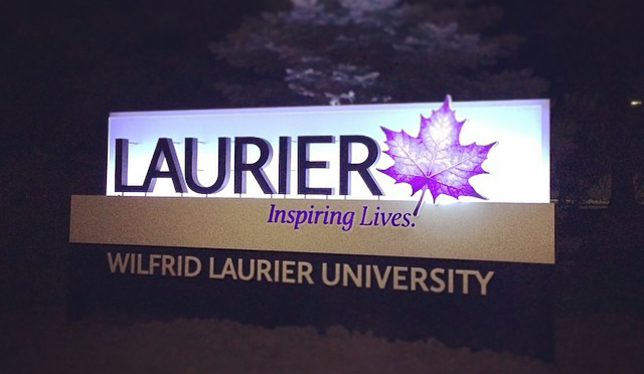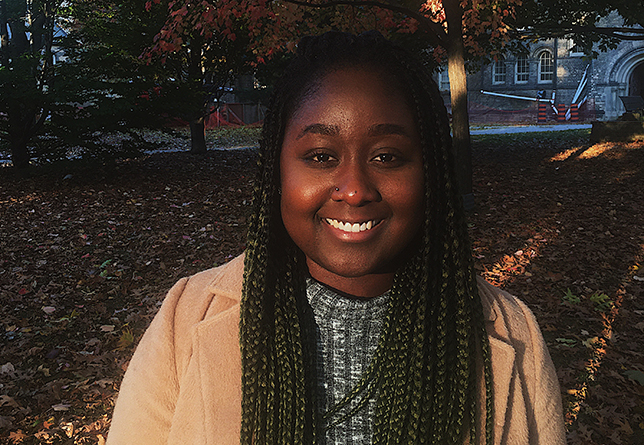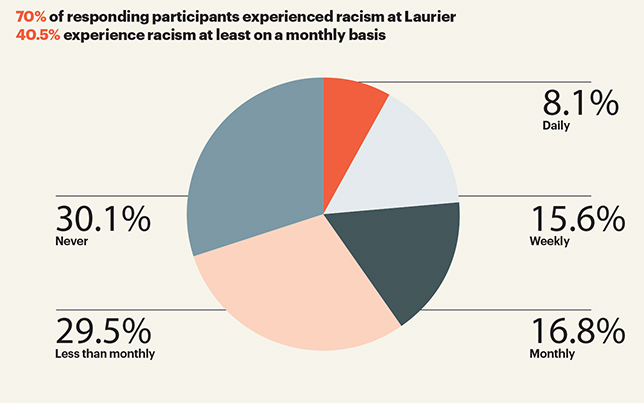Undergraduate researcher team releases report on racism at Laurier
70 percent of respondents said they had witnessed or experienced racism on campus.

A recent study at Wilfrid Laurier University has found that racialized students, faculty and staff regularly experience racism. The results of the research came as no surprise to the undergraduate students who ran the survey and the faculty mentor overseeing them. “It’s not surprising at all because we do collectively experience these things,” says Paige Grant, one of the students who led the project. “We all know that it’s happening.”
The Being Raced study, conducted by Ms. Grant and students Azka Choudhary, Joey Lee and Kate Harvey, collected 177 anonymous online surveys and 37 confidential interviews from Laurier community members, between December 31, 2016 and July 12, 2017, as part of Laurier’s undergraduate research apprenticeship program. Most respondents, 70 percent, said they had experienced racism on campus. Seventy-six percent said they had witnessed racism at Laurier. According to the study, racism is most likely to occur while in class or walking to class, in residence, talking with professors, in student government and in athletics. Nearly 86 percent of respondents said they do not report racist encounters and do not believe, or are unsure if, administration is genuinely concerned with confronting racism on campus.

Ms. Grant, now a master’s student at the University of Toronto, says the inspiration for the research topic came from lived experience and seeing a lack of diversity on campus. She says she and the other student researchers had each experienced racism in some way, and felt the university would only listen to them if their experiences were presented as research data. “Even if they know that racism is happening, even if they know that students, staff and faculty are experiencing this, the only type of validation that they consider, really, is research, is through a report like this,” she says.
Being Raced lists nearly 40 calls to action for administration, faculty, residences, student government and athletics. They range from simply acknowledging the existence of racism on campus, to building support systems for racialized students, to conducting mandatory anti-racism training for members of student government and athletic staff. Of all the recommendations listed in the report, Ms. Grant says the first thing Laurier should do is hire more racialized faculty and staff.
Vanessa Oliver is an associate professor in the faculty of liberal arts at Laurier. She was the group’s mentor for the project and agrees that hiring faculty and staff who reflect the diversity of the student body would be helpful. She says the study results show that most professors aren’t even aware when these racist incidents occur in their classrooms and offices, or elsewhere around campus. “I think folks are well intentioned but … especially for professors who are white, [our] white privilege protects us from having to know what the experience of racism looks like and feels like,” Dr. Oliver says. Implementing mandatory anti-racism training for faculty to help them understand how they perpetuate racism would be an important move, she adds.

Pamela Cant, Laurier’s assistant vice-president of human resources and equity, says the university welcomes the report’s findings and calls to action, and that there is ongoing equity, diversity and inclusion (EDI) work happening Laurier. “I think the information contained in the report provides some really important insight,” she says. “Racism is something that exists on university campuses and unfortunately in society as a whole. That’s really important for us to acknowledge … and realize that we need to take proactive steps in order to ensure that we have an inclusive community here at Laurier.”
The university has appointed two EDI faculty colleagues to look at improving the experience of all underrepresented groups, Ms. Cant says. Laurier also recently hired a senior advisor of equity, diversity and inclusion who will be dedicated to developing “institution-wide strategy and initiatives around equity, diversity and inclusion and anti-racism will be a big part of the mandate for that position.”
Ms. Grant says she and her team of student researchers presented the report to university administration, which included Ms. Cant, before the official launch of Being Raced in September. She hopes the report brings change to Laurier, without the university needing to conduct further research. “This was way too much labour for racialized people to [take on]. It wasn’t enough to say we’re experiencing it,” Ms. Grant says. “It’s 2019. It’s so hard to prolong this inclusion and diversity talk. Things need to happen.”
Featured Jobs
- Medicine - Associate or Full Professor Professor (Kidney Health)Université de Montréal
- Engineering - Assistant or Associate Professor (Robotics & AI)University of Alberta
- Architecture - Assistant Professor (environmental humanities and design)McGill University
- Finance - Faculty PositionUniversity of Alberta
- Sociology - Tenure-Track Position (Crime and Community)Brandon University















Post a comment
University Affairs moderates all comments according to the following guidelines. If approved, comments generally appear within one business day. We may republish particularly insightful remarks in our print edition or elsewhere.
7 Comments
Excellent project by Ms. Grant and the students mentored by Dr. Oliver. Sadly this is the same case at the University of Guelph campus as well. Systemic barriers to ethnically diverse faculty and staff, body shaming and under the carpet racism are quiet omnipresent at all levels within the University of Guelph campus. With significant turnover of staff and faculty due to racism, UoG is grappling with the reality. I hope the lessons learned from WLU can be applied in the UoG.
Is it any surprise that racism exists on campus in a country where the response to calls for reconciliation between a population of people targeted for genocide and the rest of the Canada is to create race based hiring initiatives in our universities (i.e., cluster hiring with specific racial membership specified as a qualification criterion)? Even our most accomplished academics (assuming they’re the ones in leadership positions at universities making these decisions and comprising the Canadian Association of University Teachers) are incapable of effectively addressing racism. How on earth can we expect anyone else to do so at these institutions if the leaders making the decisions that shape how the university runs are incapable of doing so?
The data was all self reported, without a definition of racism given to students. This is a completely bogus study that lacks academic rigour. The students conducting the study had a preconceived outcome in mind and phrased the questions in the survey to achieve that end: “She says she and the other student researchers had each experienced racism in some way, and felt the university would only listen to them if their experiences were presented as research data.” Complete bias confirmation.
Read Sokal’s book “Beyond the Hoax” for a discussion on the lack of academic rigour in cultural studies. This approach, while it may have the appearance of being supportive, is exceedingly dangerous when it spreads across academic fields. Could you imagine the same lack of rigour in medicine, or other sciences? The results would be catastrophic.
Do not take these studies lightly. It is NOT racist to point out that these results and conclusions are meaningless.
I find this news article racist. It must be since racism has no definition and nobody is allowed to question my lived experience.
See how easy it is?
genuine question to @William Lane and @Melissa: what is gained from exerting energy to poke holes in the rigour of an undergraduate research project as opposed to say engaging with it for what it is, an important learning experience, which reveals distinct patterns in terms of the experience of students at this university, and that could be the start of a broader conversation or more research?
I have to agree. Race is a social construct and thus racism is an individual experience. I, nor someone else, can determine whether the experience was racism or not. So while the study limitations mentioned are potentially accurate this would potentially be a source of misclassification bias. So the results would not be fully ‘useless’ as stated but size of effect we may have less confidence in. Even with this the results of the survey found racism was being experienced by students on a university campus in Canada. This is unacceptable in this country that prides itself on its safe, welcoming and tolerant People. Any person experiencing racism in Canada is unacceptable. Any attempts to reject or minimize personal experiences of racism due to academic rigour by those privileged should further examine their motives and critically confront their own biases.
@Daniel McKennitt and @bob, the key reason for poking holes in research which finds that people experience an undefined experience is that if it is not defined, there is no way to target it. How do you resolve a problem if nobody really knows what the problem is?
If someone says they need footwear, you might run out and buy them socks, while I might run out and buy them slippers and someone else might run out buy them steel-toed boots. If what was meant was that they needed dress shoes, none of us would have offered a helpful solution and the problem would continue to exist for that person.
Consider some of the common experiences of racism:
– perceived reason for being denied an opportunity (in which case it would be necessary to find out what the rationale and evidence supporting it for denying the opportunity was, comparing that to rationale for the support for the recipient of the opportunity and then correcting whomever is in the wrong)
– hate speech and hate crimes (in which case, measures to ensure immediate physical safety must be implemented and the sources of these crimes need to be addressed/consequented)
– microaggressions (in which case, it would be necessary to find out what the “aggressor’s” intent was. This is a tricky one to deal with because sometimes, the perceiver is ascribing intent on the basis of the “aggressor’s” identity and relies upon ability to confirm that this was, in fact, the intent)
Each of these instances, which is not an exhaustive nor thorough list of examples of racism, has very different impacts, consequences and solutions to both the receiver of the racism and the perpetuator of the racism.